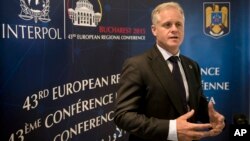The U.N. Security Council will meet Friday to discuss the threat of foreign terrorist fighters - both to the conflict zones where they fight and to their home countries when they return. Several interior ministers will attend the high-level session, including the U.S. chief of Homeland Security.
The United Nations estimates that there are between 15,000 and 20,000 foreign terrorist fighters – or FTFs – maybe even 30,000. The fighters are as young as 14-years-old and include women. They come from virtually every corner of the world.
FTF's are not just menacing the Middle East -- where Islamic State, al-Qaida and al-Nusrah have become synonymous with beheadings, kidnappings and suicide bombings, but also Africa where al-Shabab and Boko Haram, as well as other armed groups, are terrorizing and displacing large populations.
The Security Council will assess progress since September, when President Barack Obama presided over the adoption of a resolution intended to halt the flow of FTFs. The resolution called for the implementation of several measures, including the screening of airline passenger lists, disrupting funding to armed groups, and improving the sharing of relevant information among states to stop terrorists from recruiting, planning or participating in attacks.
The resolution also directed the Security Council’s Counter-Terrorism Committee, and its Executive Directorate, known as CTED, to report on the capacities of countries to respond to the challenges posed by foreign terrorist fighters. CTED will present its initial report covering 21 countries identified as most affected by that threat at Friday’s meeting.
“This phenomenon, which is a serious threat to international peace and security, is obviously not new. However, the magnitude of this threat is unmatched," said Jean-Paul Laborde, the head of CTED. We, therefore, need to adapt our response – ‘our’ means member states, also civil society, media – all together – to address the current threat of FTFs effectively."
The report warns that FTF's are an “acute and growing threat.” They intensify conflicts and may pose a significant threat to their home countries, the countries they pass through, and states that neighbor conflict zones.
The study found several gaps. Only 5 of the 21 surveyed states require airlines to submit advance passenger information; only one conducts immigration controls of transiting passengers in its airports; and only four are able to immediately freeze terrorist funds. CTED’s Laborde said much work needs to be done to ensure the full implementation of the Council’s resolution.
“The lack of implementation of these measures allows Foreign Terrorist Fighters to operate with impunity," he said.
There is also good news. Nearly all of the 21 states surveyed have taken steps to make it a crime to incite people to terrorism, including through the Internet, and most have developed some mechanisms to disrupt and prevent the flow of money to terrorists.




